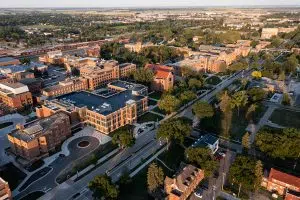
A team of UND researchers has received $250,000 in funding to develop the plans needed to successfully launch the Energy Sovereignty for Indigenous Peoples (ESIP) Global Center (GC).
Funding for the two-year grant comes through the National Science Foundation’s inaugural Global Centers Competition, which seeks to establish collaborative research centers that generate community engagement to develop research on climate change and clean energy. The UND research team will work to establish a Global Center focusing on Indigenous energy sovereignty.
“NSF builds capacity and advances its priorities through these centers of research excellence by uniting diverse teams from around the world,” said NSF Director Sethuraman Panchanathan in an agency release. “Global Centers will sync talent across the globe to generate the discoveries and solutions needed to empower resilient communities everywhere.”
Alongside the NSF, funding for the Global Centers program came from funding agencies in Australia, Canada and the United Kingdom. Together, those agencies awarded more than $76 million in grants. The program is broken down into two tracks. Track 1 funding is for plan implementation, and Track 2 grants are provided as seed funding to more formally develop the teams and science for future Track 1 grant competitions. UND joins 14 other institutions in receiving Track 2 funding.
Indigenous communities often consist of rural, remote, spread-out populations with distributed, smaller-scale power, heat, and fuel energy systems, which are less reliable and may be less resilient to anticipated shifts in weather patterns and severity due to climate change.
At UND, ESIP will plan a suite of research tasks in four key technology areas to provide sustainable, reliable, and efficient engineering infrastructures and solutions for Indigenous energy sovereignty around the globe.
A key component of the grant is to interact and connect with selected Indigenous peoples that can model the breadth and diversity of Indigenous peoples around the world. The research team will be having structured conversations with these selected communities to gain an understanding of both their short-term needs as well as their long-term aspirations as they relate to how they generate, manage, and utilize energy to support their peoples.
From these conversations, the team will develop a framework for both long-term transformative research as well as short-term technology development. Toward this goal, the UND team envisions a 10-year plan. This framework will also influence the expertise that the Center will recruit for participation in ESIP research. These experts will be recruited from around the world and include physical scientists, engineers, social scientists, technology transfer & business development specialists, and economists.
UND has already established partnerships with researchers at North Dakota State University, Kansas State University, Haskell Indian Nations University, Turtle Mountain Community College, Nueta Hidatsa Sahnish College, and the Tribal Nations Research Group.
This collaborative group of researchers are already working on a previously awarded $4 million grant from the NSF’s Established Program to Stimulate Competitive Research (EPSCoR) program. The goal of the EPSCoR grant is to develop a suite of renewable energy and microgridtechnologies, along with associated economic, sustainability, and social impact data for use by tribal nations to support their energy sovereignty. Under the Global Centers program, this same concept will be expanded to the global scale.
International partnerships include the University of Manitoba, which will work with First Nations local communities in Canada. Another partner is the University of Leeds (UK), which will seek to partner with Indigenous peoples located in current or former Commonwealth countries. Additionally, ESIP will develop new connections and relationships with Indigenous communities throughout the global south to develop the infrastructure to address both long-term and short-term Indigenous community needs. ESIP will work directly with Indigenous community members and practicing Indigenous scientists and engineers to help shape the ESIP research agenda.
.
(UND release, photo)